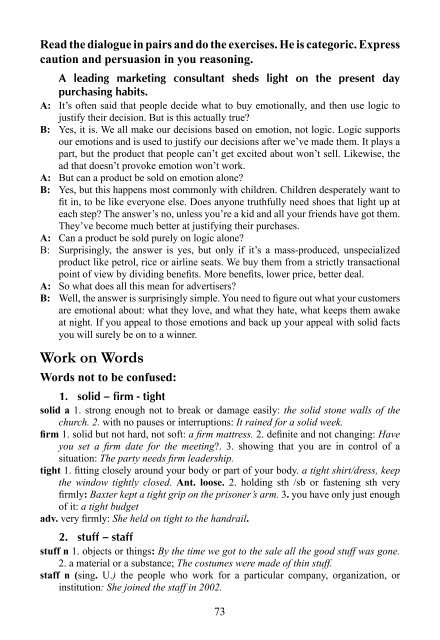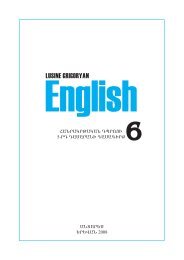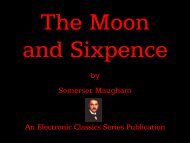Focus on Words
Focus on Words
Focus on Words
Create successful ePaper yourself
Turn your PDF publications into a flip-book with our unique Google optimized e-Paper software.
Read the dialogue in pairs and do the exercises. He is categoric. Express<br />
cauti<strong>on</strong> and persuasi<strong>on</strong> in you reas<strong>on</strong>ing.<br />
A leading marketing c<strong>on</strong>sultant sheds light <strong>on</strong> the present day<br />
purchasing habits.<br />
A: It’s often said that people decide what to buy emoti<strong>on</strong>ally, and then use logic to<br />
justify their decisi<strong>on</strong>. But is this actually true?<br />
B: Yes, it is. We all make our decisi<strong>on</strong>s based <strong>on</strong> emoti<strong>on</strong>, not logic. Logic supports<br />
our emoti<strong>on</strong>s and is used to justify our decisi<strong>on</strong>s after we’ve made them. It plays a<br />
part, but the product that people can’t get excited about w<strong>on</strong>’t sell. Likewise, the<br />
ad that doesn’t provoke emoti<strong>on</strong> w<strong>on</strong>’t work.<br />
A: But can a product be sold <strong>on</strong> emoti<strong>on</strong> al<strong>on</strong>e?<br />
B: Yes, but this happens most comm<strong>on</strong>ly with children. Children desperately want to<br />
fit in, to be like every<strong>on</strong>e else. Does any<strong>on</strong>e truthfully need shoes that light up at<br />
each step? The answer’s no, unless you’re a kid and all your friends have got them.<br />
They’ve become much better at justifying their purchases.<br />
A: Can a product be sold purely <strong>on</strong> logic al<strong>on</strong>e?<br />
B: Surprisingly, the answer is yes, but <strong>on</strong>ly if it’s a mass-produced, unspecialized<br />
product like petrol, rice or airline seats. We buy them from a strictly transacti<strong>on</strong>al<br />
point of view by dividing benefits. More benefits, lower price, better deal.<br />
A: So what does all this mean for advertisers?<br />
B: Well, the answer is surprisingly simple. You need to figure out what your customers<br />
are emoti<strong>on</strong>al about: what they love, and what they hate, what keeps them awake<br />
at night. If you appeal to those emoti<strong>on</strong>s and back up your appeal with solid facts<br />
you will surely be <strong>on</strong> to a winner.<br />
Work <strong>on</strong> <strong>Words</strong><br />
<strong>Words</strong> not to be c<strong>on</strong>fused:<br />
1. solid – firm - tight<br />
solid a 1. str<strong>on</strong>g enough not to break or damage easily: the solid st<strong>on</strong>e walls of the<br />
church. 2. with no pauses or interrupti<strong>on</strong>s: It rained for a solid week.<br />
firm 1. solid but not hard, not soft: a fi rm mattress. 2. definite and not changing: Have<br />
you set a fi rm date for the meeting?. 3. showing that you are in c<strong>on</strong>trol of a<br />
situati<strong>on</strong>: The party needs fi rm leadership.<br />
tight 1. fitting closely around your body or part of your body. a tight shirt/dress, keep<br />
the window tightly closed. Ant. loose. 2. holding sth /sb or fastening sth very<br />
firmly: Baxter kept a tight grip <strong>on</strong> the pris<strong>on</strong>er’s arm. 3. you have <strong>on</strong>ly just enough<br />
of it: a tight budget<br />
adv. very firmly: She held <strong>on</strong> tight to the handrail.<br />
2. stuff – staff<br />
stuff n 1. objects or things: By the time we got to the sale all the good stuff was g<strong>on</strong>e.<br />
2. a material or a substance; The costumes were made of thin stuff.<br />
staff n (sing. U.) the people who work for a particular company, organizati<strong>on</strong>, or<br />
instituti<strong>on</strong>: She joined the staff in 2002.<br />
73
















